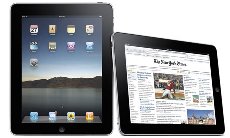Netbook Market Share Bows To Apple iPad

The global netbook and tablet PC market has felt the iPad effect. It gave the sector a boost but at the cost of netbook sales.
Sales of Apple iPads significantly impacted mobile PC shipment figures during the second quarter of 2010, DisplaySearch, an arm of the research firm NPD Group, reported. Following shipments of 3.3 million iPads, the tablet stole shares from the netbook segment but offered a boost to overall revenue figures with its relatively high average selling price.
Netbooks Drop 13 Percent
 During the second quarter, shipments of tablet PCs and netbooks, or “mini-notes”, as DisplaySearch calls them, were down four percent quarter-to-quarter but up 29 percent year-on-year. However, pulling out iPad figures from the total, states the report, shows a drop in shipment of 14 percent quarter-to-quarter and 13 percent year-on-year.
During the second quarter, shipments of tablet PCs and netbooks, or “mini-notes”, as DisplaySearch calls them, were down four percent quarter-to-quarter but up 29 percent year-on-year. However, pulling out iPad figures from the total, states the report, shows a drop in shipment of 14 percent quarter-to-quarter and 13 percent year-on-year.
“The end of 2007 witnessed the launch of mini-notes. The first quarter of 2010 signalled the birth of the tablet PC, and possibly by extension, the beginning of the end of the mini-note market, especially in developed regions,” John Jacobs, director of notebook market research, said in a statement. “Apple has leveraged their successful iPhone business model onto the iPad.”
Had Apple not struggled to meet demand when shipments to Japan and China began just at the end of the period, the “Apple Effect”, as the report calls it, would have been more pronounced.
Going forward, DisplaySearch expects netbooks to continue to sell well among first-time PC buyers in emerging markets. In regions with high PC penetration rates, it expects tablets to continue to take market share from the netbook and ultraportable segment.
“More than 50 other brands have tablets in varying stages from development to mass production,” said Jacobs. “Unlike the mini-note/netbook model, which was not much more than a low-cost, basic, mobile PC based on the Wintel platform, the majority of tablets have, or will choose, a combination of next-generation Intel Atom CPUs or ARM-based CPUs paired with a version of Android or, in the case of HP, WebOS.”
BlackBerry-maker Research In Motion confirmed its place among the ranks of brands, with the official introduction of its PlayBook, a tablet that will run an OS based on technology from QNX, a company it acquired in April.
“Although Apple now holds the vast majority of tablet PC market share,” Jacobs added, “the plethora of other brands that have, or will soon be launching, their own tablets are sure to capitalise on what, at this point, appears to be widespread consumer demand for very thin and very light devices with exceptional battery life and a primary focus on portability and content consumption.”
Overall, the portable PC market experienced strong year-on-year growth, rising 32 percent to 50.4 million units. Buyers wanting a thin, lightweight device turned to the iPad, but those wanting greater functionality chose larger notebooks, as the price gap between 11.6-inch and 15.6-inch notebooks fell to less than $60, DisplaySearch reported.
Despite a quarter-to-quarter dip in shipments for the netbook/tablet PC category, the higher price of the iPad positively affected revenue, which rose to $4 billion.
Industry consensus, states the report, is that a successful tablet business model will focus on an “a la carte method for selecting the software capabilities (apps) for the device and content consumption,” unlike the typical trend PCs have followed, centred around Microsoft’s Windows OS and suite of office applications.